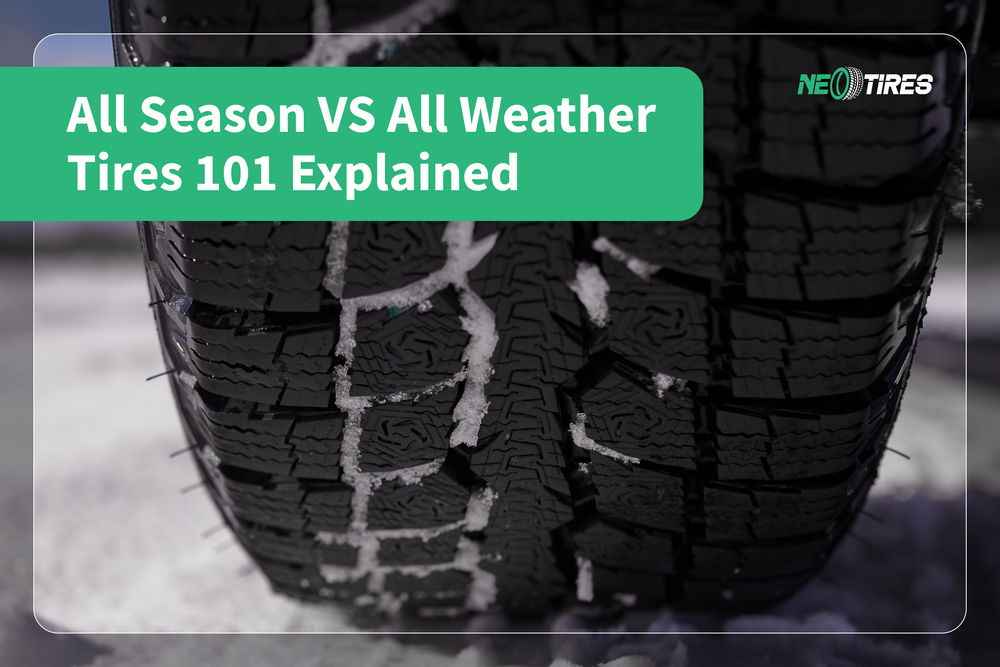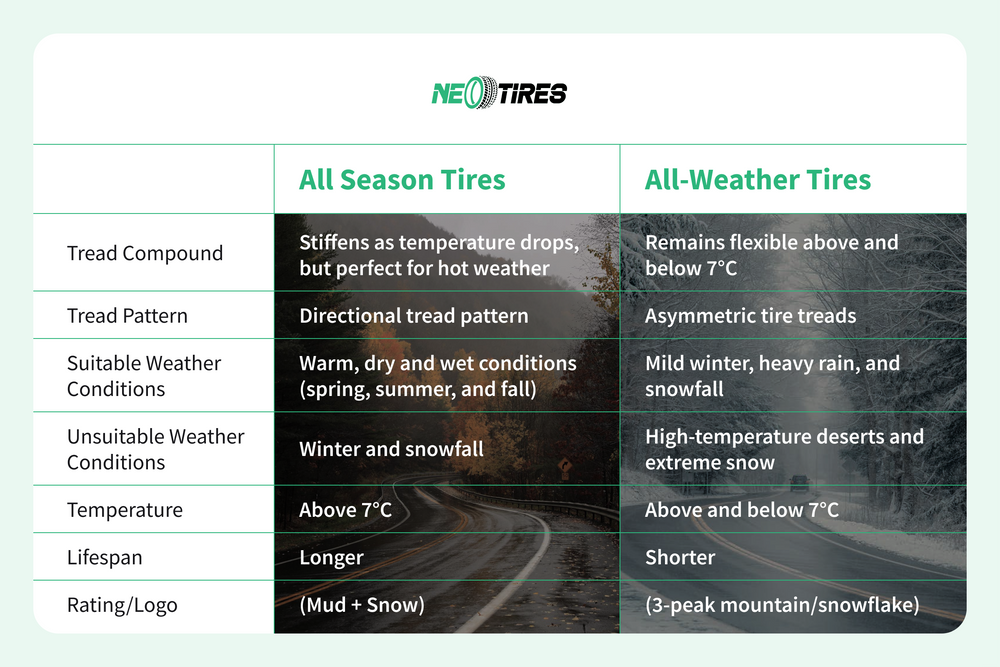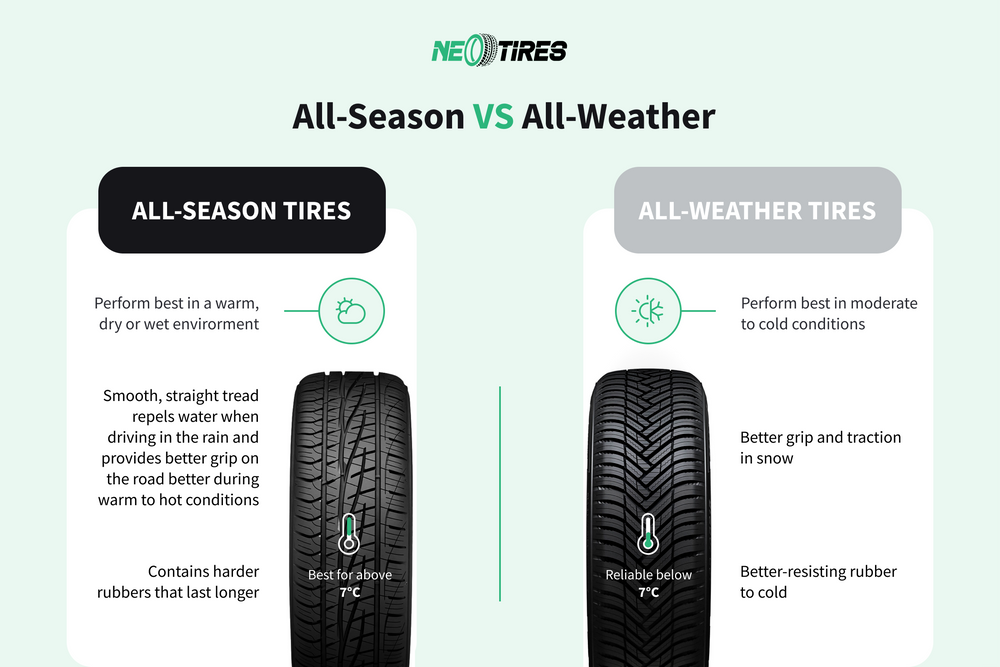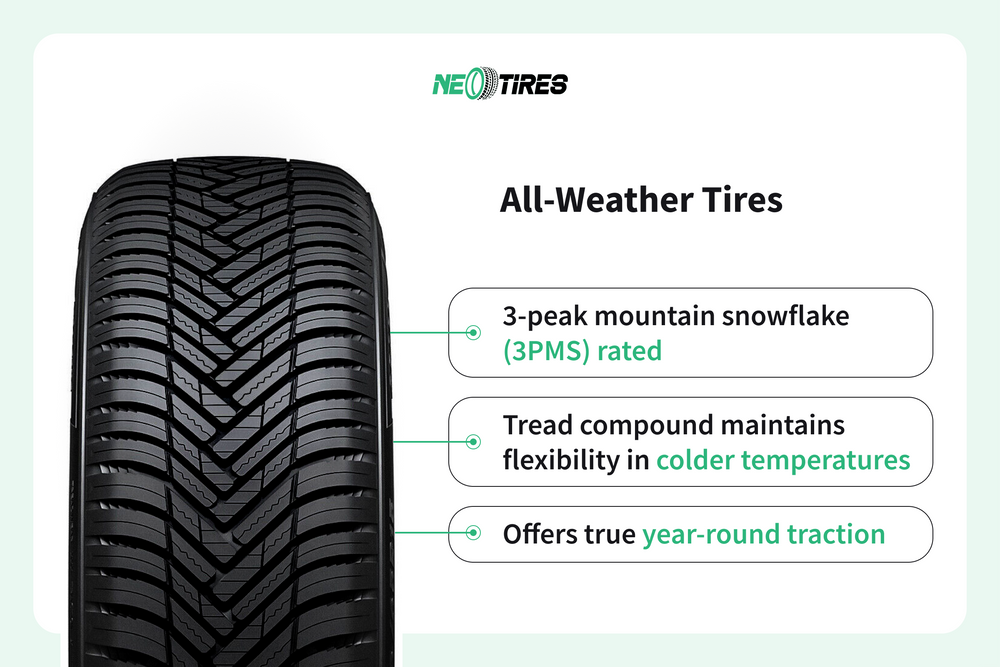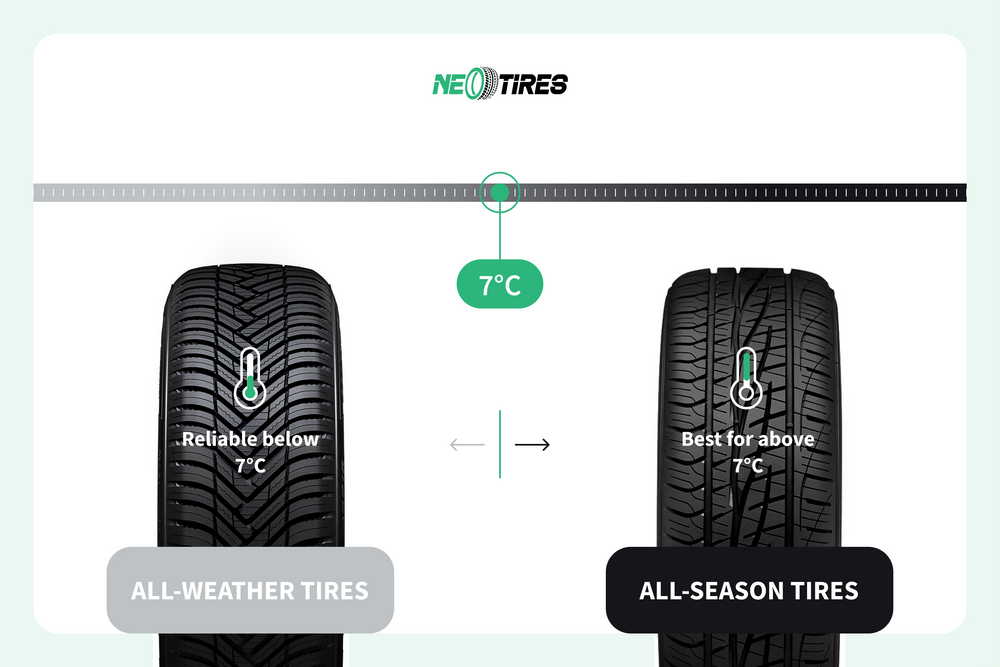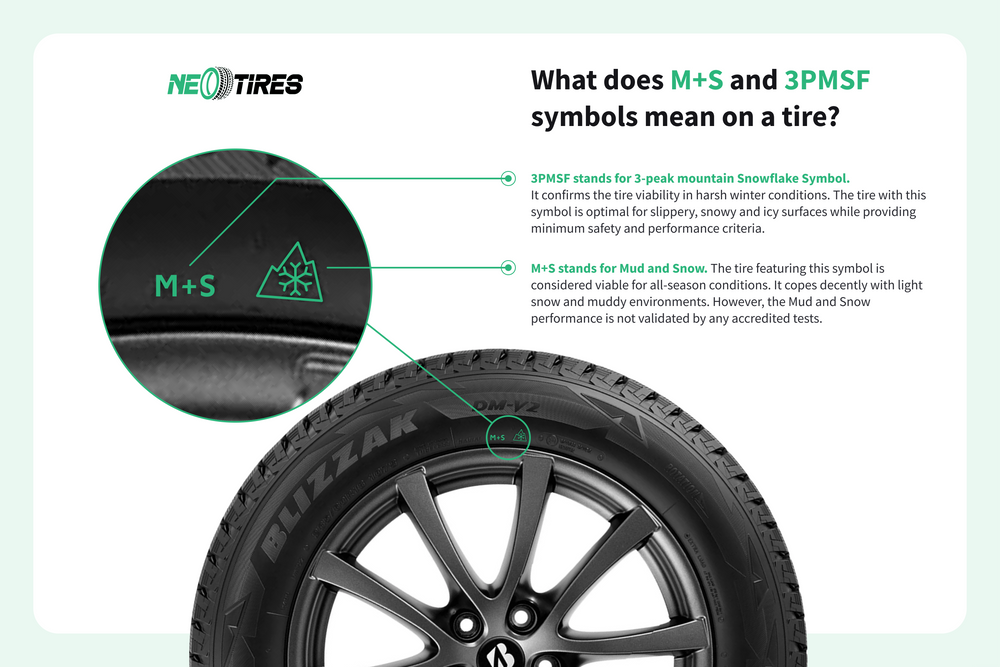No, they are not the same, even if many people think that all-season and all-weather tires do not differ between them. Indeed, these 2 types of tires, actually, share many aspects in common. At the same time, some subtle characteristics differentiate them. As such, each type of tire has its audience that chooses them according to certain conditions.
In this article, we will explore the differences and similarities between all-season and all-weather tires down to the smallest details. At the end of the post, you will know what makes them different and which ones suit your needs better. Say no more, let's get down to business!
Specific Particularities of All Season VS All Weather Tires
These 2 types of tires indeed have a lot in common. However, their purpose differs, and, consequently, tire makers use different construction techniques for each of them. The fundamental differences between all-season and all-weather tires include, but are not limited to:
- tread compound
- tread pattern
- weather conditions
- temperature resistance
- lifespan
- markings
Below, you will find a graphic illustration of the differences between these tires. The conclusion you have to reach is that all-weather tires are more viable for winter conditions than all-season ones, but not as viable as winter ones. At the same time, all-season tires are much more suitable for the mild season than all-weather ones. Check it out.
All Season VS All Weather: Tread Compound
Now we will delve into the specific details of these tires and we will better understand how they are built for meed different weather conditions. We will start with the tire tread compound, which is one of the most important differences.
First of all, the tire tread compound is nothing but the tire rubber formula. When we say "formula" we mean the composition of the rubber that forms the tire. The thing is that tire manufacturers use not only pure rubber. They also add several additional compounds to meet specific goals like flexibility, durability, or thermal resistance.
If we talk about all-season tires, their composition consists of "ingredients" meant to deliver superior grip in changing tempts. This means that an all-season tire remains viable both in summer and spring conditions, as well as in autumn. This versatility of the tread compound allows drivers to use all-season tires all year round, especially in areas where the winters are very mild.
However, the all-season tread compound tends to become stiffer as temperatures drop. This means that the tire reduces its performance in extreme winter conditions and here is where all-weather tires come into play.
On the other extreme, the all-weather tire is more resistant to cold temperatures, maintaining its maximum flexibility. This means that it preserves its traction and performance properties, not being affected too much by cooling weather. At the same time, the all-weather tire remains as consistent in fall, spring, and summer conditions as an all-season tire.
All Season VS All Weather: Tread Pattern
Apart from the material in them, these 2 tires also differ in their architecture or design. First of all, the tread pattern of each tire is not just an aesthetic aspect. It plays a critical role in the tire performance and its versatility in wet or dry conditions. Second, each type of pattern meets a specific goal that aligns with the tire's basic purpose.
If we talk about all-season tires, they must, by their essence, be maximally stable in hydroplaning conditions and ensure an efficient grip in dry and relatively warm conditions. In this sense, most tires of this type have a directional pattern.
The directional pattern is reminiscent of a V-shaped design and is the most viable for efficient water evacuation and hydroplaning control. This design is enough to deal decently with muddy and snowy conditions when the temperatures are not too low yet. So, basically, all-season tires are more for conditions from slightly cold to warm, where humidity is a frequent phenomenon.
On the other extreme, all-weather tires cover more extreme winter conditions, being resistant to low temperatures and a more severe winter environment. At the same time, they remain sustainable in humid conditions when temperatures rise.
These benefits are due to the asymmetric tread pattern. This means that one part of the tire has a certain pattern, while the other part is totally different. With such a pattern, the tire copes wonderfully with a wider variety of difficult conditions. The different tread blocks and challenges on both sides cover both wet conditions and those specific to harsh winters, which is not characteristic for all-season tires. 2
Tire makers have all the freedom to diversify the tread patterns of the 2 types of tires. They do not always have an arrow-shaped design. Either way, the manufacturers always take into account the fundamental purpose of the tire and the tread pattern always aligns with it.
All Season VS All Weather: Weather Conditions
Weather conditions are another important criterion that differentiates all-weather tires from all-season ones. We recommend drivers take into account the weather conditions in which they usually drive in order to make the right choice between the 2 types of tires.
If we talk about all-season tires, they feel like fish in the water in relatively warm, wet, or dry conditions. In fact, they are also viable for cold conditions. However, the colder they become, the more tire performance decreases.
So, basically, the term "all-season" includes 3 seasons of the year, that is, summer, fall, and spring. These are also optimal for winter, but only if the winter is not aggressive.
On the other extreme, all-weather tires provide wider climate versatility. They perform confidently even in conditions of harsh snowfall and low temps due to the composition and the adapted pattern. In addition, they have a thicker rubber compound to ensure traction and grip below zero.
Great Britain drivers usually rely on all-season tires year-round. Winters are relatively mild in which snow is an occasional phenomenon. North America, on the other hand, is famous for harsher winters with plenty of snow. In these areas, all-weather, or even specialized winter tires are an absolute must.
All Season VS All Weather: Unsuitable Weather Conditions
Many drivers mistakenly believe that some good all-season or all-weather tires will cope with extreme winters. The truth is that none of the 2 types are viable enough for aggressive and long-lasting winters. An all-weather tire will indeed do better than an all-season one in snow. However, this will not perform as well as a specialized winter tire.
So, please, do not consider these tires for areas where winters make road traffic difficult. In this sense, studded or studless winter tires are the most suitable for frosty and aggressive winters. Nowadays, the advanced tire industry offers viable all-season models for winter conditions. While these provide appreciable traction and performance on light snow, they are not as resistant and performant as a true winter tire.
On the other extreme, all-season and all-weather tires resist high temperatures differently. While all-weather ones are more viable for cold conditions, the all-season ones are more viable in warm conditions. All-weather tires are built with cold temps in mind, unlike the all-season ones. Their rubber compound is less resistant to heat and their performance is likely to drop if used in hot conditions. As such, all-season tires are a much wiser decision for drivers who live in areas with moderate to warm climates.
All Season VS All Weather: Temperature
As we specified before, tire makers use special formulas in the rubber of each tire. The components in the tires also influence their resistance at different temperatures. In the case of all-season tires, they stay reliable and performant at a temperature of 5-7°C and above. As the temperature drops, they become more rigid and lose their performance quality in too-cold conditions.
On the other hand, the all-weather tire has a more cold-resistant composition. This means that the rubber remains foldable and flexible even at temperatures below zero. This allows the tire to provide sustainable traction and grip in cold weather. However, this benefit comes with the sacrifice of versatility in warmer conditions. The more the temperature rises, the more unsuitable it becomes.
Notably, these will still do well in warm weather, but a set of all-season or summer tires is much better for the hot season. As we mentioned before, all-weather tires are built with winter performance in mind.
All Season VS All Weather: Lifespan
One of the priorities of all-season tires is their long-lasting lifespan. When building them, tire makers use special compounds to stay durable and preserve the tire tread for as long as possible. Consequently, they are among the most durable tires in the industry, serving up to 90,000 miles.
As for the all-weather tires, they serve for a shorter period. The purpose of all-weather tires is to ensure year-round versatility with a priority on winter reliability. As such, the aspect of longevity is a secondary one. Therefore, all-weather tires usually come with a mileage of about 60,000 miles.
So, here comes the moment when you have to decide what is more advantageous to you: shorter mileage in favor of winter reliability?! Or a tire with impressive mileage but with the price of a reduced winter performance?!
All Weather VS All Season: Markings And Ratings
A final difference between the 2 types of tires is the markings you find on their sidewalls. Tire markings talk about all the important specifications of the tire including size, diameter, pressure, speed, and load rating.
In the case of all-season tires, they have the M+S marking that speaks of their Mud and Snow versatility. However, keep in mind that "Snow" in the given case refers to mild winter conditions.
As for the all-weather tires, they have the "3PMSF" marking. This is deciphered as a 3-Peak Mountain Snowflake rating. This rating refers to the certification of the tire as viable and safe in winter conditions.
The 3PMSF certification is more reliable in terms of snow performance than the M+S one. So, whenever you see any of these markings on tires, you will be able to better understand what are the optimal conditions for their usability.
What Is The Difference Between All-Weather and Winter Tire?
Now that you already know more about the profiles of all-season and all-weather tires, you are probably asking yourself: what is the difference between an all-weather tire and a winter tire? Apparently, an all-weather tire seems to be identical to a winter tire in terms of performance and resistance in cold conditions. However, all-weather and winter tires are different. Let's see how they differ.
Unlike all-weather tires, winter tires are meant exclusively for harsh winter conditions. Their structure is very resistant to extreme temperatures. In addition, their design is much more prepared to bite through ice and snow confidently for ultimate winter traction.
In no case should winter tires be used in warm conditions. Their rubber is not prepared for hot temperatures and the driver will only experience adverse effects if he does not change them to all-season or summer tires in the hot season.
On the other extreme, the all-weather tire, as you know, is more universal for cold AND moderate conditions. However, this does not perform as well as a specialized winter tire in extremely snowy conditions.
All Season vs All Weather: FAQs
Which is Better All Weather or All Season?
Both tires are good as long as they are used for their purpose. All-season tires are a better choice for relatively warm weather with alternations between wet and dry conditions. If we talk about relatively colder weather characterized by snowfall, frequent rains, ice, and slush, then all-weather tires are more suitable. All-season tires are less resistant to cold. On the other hand, all-weather tires have a special formula that does not compromise their performance when the temperatures drop.
What Is the Downside of All-Weather Tires?
Comparing all-weather tires with winder-dedicated ones, for example, they slightly succumb to the challenges of harsh snow conditions. After all, winter tires are the most optimal for severe conditions when severe snow and ice challenge the tires' performance. All weather tires are suitable for cold and slightly snowy conditions as well as for relatively warm conditions. However, they should not be the number one choice for severe conditions and extremely low temperatures. Winter tires are a more rational option in such circumstances.
Can I Use All-Season Tires in Winter?
It depends on the winter conditions. In some areas of the US, winters are wet and mild. In this case, all-season tires are quite safe and perform quite decently. If you live in areas with a severe climate and harsh snow and ice, all-season tires become rigid and dramatically reduce their traction and grip properties. This increases the risk of losing control over the vehicle in severe conditions, which is why they are not recommended in harsh winters. In such circumstances, a set of winter tires is a more reasonable decision.
Do All-Weather Tires Use More Fuel?
Statistically speaking, all-weather tires use a little more fuel compared to their all-season counterparts. However, it should be mentioned that the difference is not substantial. All-weather tires use a special formula that makes them resistant to low temperatures. In addition, they have a more aggressive tread to be able to deal better with severe snow. Their specific construction and architecture add a bit of effort to the vehicle's engine to propel them forward, which is why they require a bit more fuel.
Are All-Weather Tires Noisy?
The tread of all-weather tires is somewhat more aggressive compared to all-season ones which makes them more capable in snowy weather As a result, they might generate slightly more noise during rides. On the other hand, this small shortcoming is compensated by better traction in winter conditions. If you drive mostly in mild conditions and you don't need winter traction, then all-season tires will give you a smoother ride because they are slightly quieter. If the winter conditions are quite severe, we recommend opting for all-weather tires even with the price of a slightly more expressive noise. Safety should be your number one priority.
Can You Use All-Weather Tires in Summer?
All-weather tires can be a good option in summer whenever the temperatures are not extremely high. They maintain their elasticity and performance both at relatively cold temperatures and at relatively warm ones. If the summers in the area where you live are too hot, you should consider a set of specialized summer tires.
Should I Get All Season Tires Or Winter Tires?
To make the right choice, you need to understand the specifics of the winters in the area where you live. All-season tires are a good choice if the winters are relatively dry and the temperatures are slightly above 0 degrees Celsius. On the other hand, they are not a good idea if winters are characterized by abundant and constant snow and ice. Snow tires are a better option for these conditions.
Should You Buy All 4 Tires at Once?
The short answer is yes. If you prioritize the safety of your driving, then replacing all 4 tires at once is the right way to go. Each tire wears out independently. In this case, replacing only 2 tires might generate performance conflict between the old and the new tires. With the installation of 4 identical tires in the same condition, you reduce the potential damage to the drive train, overall performance, and further uneven wear.
Why Trust Us?
The NeoTires team is dedicated not only to the best tire deals but also to tire education. We want to offer as much truthful information as possible to drivers so that the risks associated with driving decrease as much as possible. For this purpose, we have gathered specialists in the field in our team who share their experience regarding tires and everything related to their use and safety.
In addition, we have our own technical service center where we test and evaluate the tires we offer for sale. Thus, any tire review as well as any safety tip in this blog is checked and validated by the specialists we collaborate with. We have been active in this industry for more than 5 years. During this period, we did not stop to self-develop to keep up with trends, innovations, and novelties in the field of tires.
The entire NeoTires team is firmly convinced that tires are more than a piece of rubber that connects the car body with the road. They have an extremely high responsibility in terms of performance and, most importantly, driving safety. Our goal is to bring this message to our customers and readers. For this, we collaborate with experts in the field as well as perform our own tests.
Thus, we are more than an online tire shop. We are a reliable source of information and a technical center dedicated to analysis and research. You can trust us because we, in turn, trust the team of specialists who help us run this activity with dignity and professionalism.
All Weather or All Season: Which One Is Better?
There is no single answer to this question. Each driver must decide for himself, taking into account his driving needs and conditions. When it's time for new a tire, we recommend that you carefully analyze the environment in which you will use the tires. If cold, dry, snowy conditions prevail, then all-weather tires will give you more confidence.
If the environment is predominantly humid, and relatively warm, with light and occasional snow, all-season tires are a good option. All-season tires are usually more affordable than all-weather tires. However, we recommend not to be influenced by the price. The number one priority must be matching your location and driving conditions with your tires. Drive safe and choose wisely!




